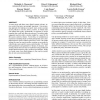Free Online Productivity Tools
i2Speak
i2Symbol
i2OCR
iTex2Img
iWeb2Print
iWeb2Shot
i2Type
iPdf2Split
iPdf2Merge
i2Bopomofo
i2Arabic
i2Style
i2Image
i2PDF
iLatex2Rtf
Sci2ools
127
click to vote
CHI
2011
ACM
2011
ACM
Exploring reactive access control
As users store and share more digital content at home, access control becomes increasingly important. One promising approach for helping non-expert users create accurate access policies is reactive policy creation, in which users can update their policy dynamically in response to access requests that would not otherwise succeed. An earlier study suggested reactive policy creation might be a good fit for file access control at home. To test this, we conducted an experience-sampling study in which participants used a simulated reactive access-control system for a week. Our results bolster the case for reactive policy creation as one mode by which home users specify access-control policy. We found both quantitative and qualitative evidence of dynamic, situational policies that are hard to implement using traditional models but that reactive policy creation can facilitate. While we found some clear disadvantages to the reactive model, they do not seem insurmountable. Author Keywords Acc...
Related Content
| Added | 25 Aug 2011 |
| Updated | 25 Aug 2011 |
| Type | Journal |
| Year | 2011 |
| Where | CHI |
| Authors | Michelle L. Mazurek, Peter F. Klemperer, Richard Shay, Hassan Takabi, Lujo Bauer, Lorrie Faith Cranor |
Comments (0)

